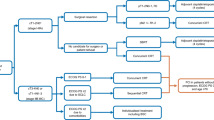Abstract
Purpose
This study aimed to explore the clinical implications of ctDNA for epidermal growth factor receptor–tyrosine kinase inhibitors (EGFR-TKIs) as the first-line treatment in EGFR-mutated (EGFRm) non-small cell lung cancer (NSCLC) in real-world settings.
Methods
A total of 122 patients with NSCLC who underwent tissue and liquid next generation sequencing (NGS) tests were included. 66 patients with detected EGFR mutation in both tumor-tissue and plasma were included into the EGFRt+, p+ group, and 56 patients with EGFR mutation detected only in tumor-tissue were included into the EGFRt+, p− group. The differences in clinical characteristics, concomitant mutations and prognosis between the two groups were compared.
Results
The detection rate of the EGFRt+, p+ group was 54.1% (66/122). EGFRt+, p+ in the NGS test was particularly relevant to the size of tumors, liver metastasis, bone metastasis and TP53 mutation. In patients with TP53 mutation in ctDNA, the detection rate of EGFR mutation in ctDNA was up to 91.3%. EGFRt+, p+ could be an independent prognostic factor for first-line EGFR-TKIs treatment. Combination therapy seems to be a promising approach to improve the outcome for EGFRt+, p+ (P = 0.017, HR 0.509 [95% CI 0.288–0.897]). Moreover, the combination of TP53 mutated status and EGFRm status in plasma showed a better completion of risk stratification for PFS (Log-rank P < 0.001).
Conclusions
Co-detection of EGFR mutation in tumor tissue and plasma is an independent prognostic factor for first-line EGFR-TKIs treatment. Moreover, combination therapy could be a promising approach to improve the outcome for these patients.





Similar content being viewed by others
References
Abbosh C et al (2017) Phylogenetic ctDNA analysis depicts early-stage lung cancer evolution. Nature 545(7655):446–451
Anagnostou V et al (2019) Dynamics of tumor and immune responses during immune checkpoint blockade in non-small cell lung cancer. Cancer Res 79(6):1214–1225
Chen G et al (2021) Postoperative circulating tumor DNA as markers of recurrence risk in stages II to III colorectal cancer. J Hematol Oncol 14(1):80
Cheng ML et al (2021) Circulating tumor DNA in advanced solid tumors: Clinical relevance and future directions. CA Cancer J Clin 71(2):176–190
Esagian SM et al (2020) Comparison of liquid-based to tissue-based biopsy analysis by targeted next generation sequencing in advanced non-small cell lung cancer: a comprehensive systematic review. J Cancer Res Clin Oncol 146(8):2051–2066
Gray JE et al (2019) Tissue and plasma EGFR mutation analysis in the FLAURA trial: osimertinib versus comparator EGFR tyrosine kinase inhibitor as first-line treatment in patients with EGFR-mutated advanced non-small cell lung cancer. Clin Cancer Res 25(22):6644–6652
Guo K et al (2021) Detection of epidermal growth factor receptor (EGFR) mutations from preoperative circulating tumor DNA (ctDNA) as a prognostic predictor for stage I–III non-small cell lung cancer (NSCLC) patients with baseline tissue EGFR mutations. Transl Lung Cancer Res 10(7):3213–3225
Hanna N et al (2017) Systemic therapy for stage IV non-small-cell lung cancer: american society of clinical oncology clinical practice guideline update. J Clin Oncol 35(30):3484–3515
Hardwick SA, Deveson IW, Mercer TR (2017) Reference standards for next-generation sequencing. Nat Rev Genet 18(8):473–484
Heerink WJ et al (2017) Complication rates of CT-guided transthoracic lung biopsy: meta-analysis. Eur Radiol 27(1):138–148
Imyanitov EN, Iyevleva AG, Levchenko EV (2021) Molecular testing and targeted therapy for non-small cell lung cancer: current status and perspectives. Crit Rev Oncol Hematol 157:103194
Jin Y et al (2020) The predicting role of circulating tumor DNA landscape in gastric cancer patients treated with immune checkpoint inhibitors. Mol Cancer 19(1):154
Kalemkerian GP et al (2018) Molecular testing guideline for the selection of patients with lung cancer for treatment with targeted tyrosine kinase inhibitors: American Society of Clinical Oncology Endorsement of the College of American Pathologists/International Association for the Study of Lung Cancer/Association for Molecular Pathology Clinical Practice Guideline Update. J Clin Oncol 36(9):911–919
Kris MG et al (2014) Using multiplexed assays of oncogenic drivers in lung cancers to select targeted drugs. JAMA 311(19):1998–2006
Lam VK et al (2021) Genotype-specific differences in circulating tumor DNA levels in advanced NSCLC. J Thorac Oncol 16(4):601–609
Ma S et al (2021) The prognostic value of longitudinal circulating tumor DNA profiling during osimertinib treatment. Transl Lung Cancer Res 10(1):326–339
Mok TS et al (2009) Gefitinib or carboplatin-paclitaxel in pulmonary adenocarcinoma. N Engl J Med 361(10):947–957
Oxnard GR et al (2016) Association between plasma genotyping and outcomes of treatment with osimertinib (AZD9291) in advanced non-small-cell lung cancer. J Clin Oncol 34(28):3375–3382
Phallen J et al (2019) Early noninvasive detection of response to targeted therapy in non-small cell lung cancer. Cancer Res 79(6):1204–1213
Planchard D et al (2018) Metastatic non-small cell lung cancer: ESMO Clinical Practice Guidelines for diagnosis, treatment and follow-up. Ann Oncol 29(Suppl 4):iv192–iv237
Raja R et al (2018) Early reduction in ctDNA predicts survival in patients with lung and bladder cancer treated with durvalumab. Clin Cancer Res 24(24):6212–6222
Rolfo C et al (2018) Liquid biopsy for advanced non-small cell lung cancer (NSCLC): a statement paper from the IASLC. J Thorac Oncol 13(9):1248–1268
Wang DS et al (2019) Liquid biopsies to track trastuzumab resistance in metastatic HER2-positive gastric cancer. Gut 68(7):1152–1161
Funding
This work was supported by grants from the National Natural Science Foundation of China (81972188).
Author information
Authors and Affiliations
Corresponding authors
Ethics declarations
Conflict of interest
No authors report any conflict of interest.
Additional information
Publisher's Note
Springer Nature remains neutral with regard to jurisdictional claims in published maps and institutional affiliations.
Supplementary Information
Below is the link to the electronic supplementary material.
Rights and permissions
About this article
Cite this article
Liang, X., Zhang, W., Li, J. et al. Clinical implications of ctDNA for EGFR-TKIs as first-line treatment in NSCLC. J Cancer Res Clin Oncol 149, 1211–1220 (2023). https://doi.org/10.1007/s00432-022-03952-z
Received:
Accepted:
Published:
Issue Date:
DOI: https://doi.org/10.1007/s00432-022-03952-z




